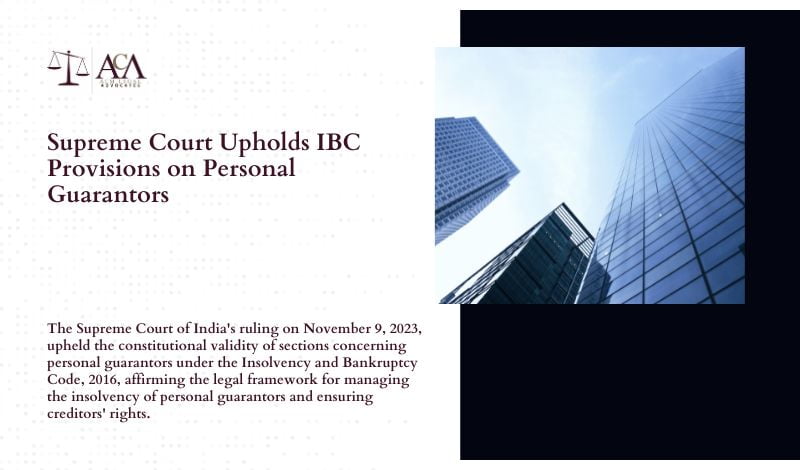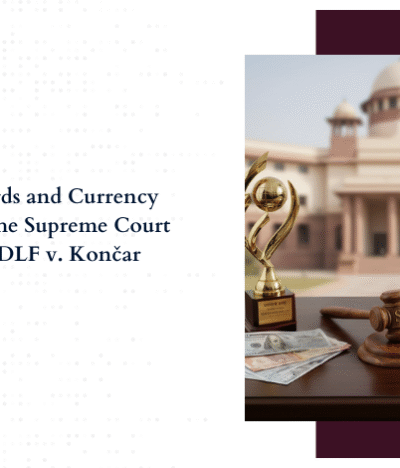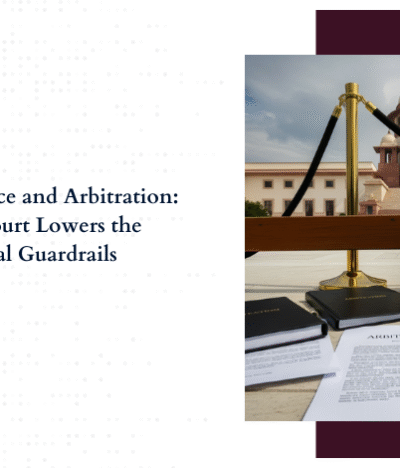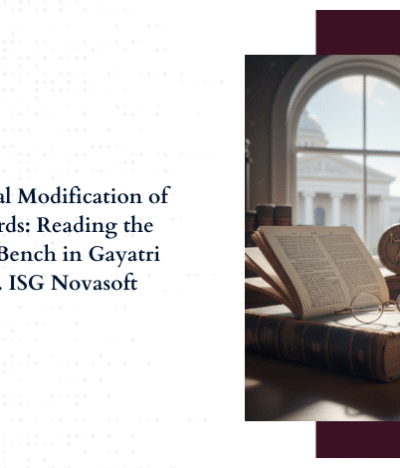Introduction to the Verdict on Personal Guarantors
The Supreme Court of India delivered a landmark judgement on November 9, 2023, addressing the constitutional validity of the sections relating to personal guarantors under the Insolvency and Bankruptcy Code, 2016 (IBC).
This judgment, arising from 384 writ petitions filed under Article 32 of the Constitution, in the case of Dilip B. Jiwrajka vs. Union of India & Ors., specifically scrutinised Sections 95 to 100 of the IBC. The core contention revolved around the alleged violation of natural justice principles, with claims that personal guarantors were condemned unheard and that the Resolution Professional was granted excessive powers. The apex court, however, upheld the constitutionality of these provisions, dismissing the petitions.
Historical Context and Legislative Framework
Before the IBC’s enactment in 2016, insolvency resolution for individuals was governed by the Presidency Towns Insolvency Act, 1909, and the Provincial Insolvency Act, 1920. These acts were repealed when the IBC came into effect, marking a significant overhaul in insolvency and bankruptcy regulation in India.
Refinement of Section 2(e) of the Code
The amendment to Section 2(e) of the IBC in 2018 extended the Code’s applicability to personal guarantors of corporate debtors, thus bringing a focused approach to handling personal guarantors’ insolvency. The original unamended Section 2(e) of the IBC, limited the Code’s applicability to ‘partnership firms and individuals’, until it underwent a revision on November 23, 2017.
This revision led to the categorization of the section into three distinct parts:
Partnership firms and proprietorship firms under Section 2(f), and Individuals other than those referred to in Section 2(e) of the Code under Section 2(g).
The Ministry of Corporate Affairs, through a notification on November 15, 2019, specified the application of Part III of the IBC to personal guarantors. This inclusion was subsequently affirmed by the Supreme Court in the case of Lalit Kumar Jain v. Union of India, establishing the groundwork for initiating insolvency resolution processes (IRP) against personal guarantors.
Liabilities and Responsibilities of Personal Guarantors
The legal framework establishes that the liability of a personal guarantor, as defined under Section 128 of the Indian Contract Act, 1872, is co-extensive with that of the principal debtor. This means that the guarantor’s commitment is on par with the debtor’s, providing a legal basis for creditors to pursue guarantors for debt recovery.
This principle was reinforced in the judgments of Industrial Investment Bank of India Ltd. vs. Biswanath Jhunjhunwala and Laxmi Pat Surana vs. Union Bank of India & Anr., clarifying that creditors could pursue personal guarantors independently of the corporate debtor’s insolvency proceedings, offering creditors a parallel avenue for debt recovery.
This stance was further affirmed by the National Company Law Appellate Tribunal (NCLAT) in State Bank of India, Stressed Asset Management Branch vs. Mahendra Kumar Jajodia, establishing a precedent for initiating proceedings against personal guarantors without concurrent insolvency or liquidation proceedings against the corporate debtor.
Insolvency Resolution Process for Personal Guarantors
The IBC outlines a detailed process for initiating and conducting the IRP for personal guarantors.
This includes the submission of an application by creditors or the Resolution Professional to the National Company Law Tribunal (NCLT). In alignment with the IBC’s provisions, creditors, or the Resolution Professional, have the authority to file an application with the NCLT to kickstart the IRP for a personal guarantor. This application must be supported by documents that verify the debt’s existence and other relevant details as prescribed
This is followed by the imposition of an ‘interim moratorium’. Upon filing under Section 95, an interim moratorium is immediately imposed on the personal guarantor, as delineated in Section 96. Subsequently, the NCLT is tasked under Section 97 to appoint a Resolution Professional.
This appointed professional is then required, as per Section 99, to scrutinize the application within ten days from their appointment and recommend to the NCLT whether the application should be accepted or rejected.
Following the Resolution Professional’s report, the NCLT, within fourteen days and adhering to Section 100, decides on the application’s fate.
Challenges to the Provisions
The Supreme Court, in the case of Dilip B. Jiwrajka vs. Union of India & Ors., was approached with several pivotal challenges against the provisions related to the IRP for personal guarantors under Part III of the IBC.
Automatic Implementation of Interim Moratorium without Prior Notification
Among the primary concerns was the automatic implementation of an interim moratorium on personal guarantors upon the submission of the application under Section 95, enacted without prior notification to the guarantor as stipulated in Section 96(1).
Mandatory Appointment of Resolution Professional and Its Implications
Additionally, the directive within Section 97 mandating the appointment of a Resolution Professional by the NCLT upon a creditor’s request was contested for stripping the judicial body of its authority to deliberate on the debt’s nuances and the guarantor’s obligations.
Principles of Natural Justice and the Right to a Hearing
A significant point of contention was the perceived infringement on the principles of natural justice, highlighted by the absence of a hearing opportunity for the personal guarantor during the initial application admission phase under Section 95. Critics argued this omission not only compromised the guarantor’s fundamental rights but also lacked a justification when compared to the rights extended to corporate debtors in similar scenarios under Part II of the IBC. This concern was amplified by the argument that the Resolution Professional, once appointed, holds the capacity to demand sensitive financial information from the personal guarantor without verifying the legitimacy of the debt or default, thus potentially violating the individual’s right to privacy.
Unrestricted Powers of the Resolution Professional
These challenges also brought to light the apprehensions regarding the unrestricted powers conferred upon the Resolution Professional, with critics arguing that such powers effectively bestow judicial responsibilities onto a non-judicial entity, undermining the procedural fairness intended by the IBC for the Adjudicating Authority, or NCLT.
Specifically, the impugned provisions under Section 99 endow the Resolution Professional with the authority to assess the debt claim made in the application under Section 95, positioning the professional’s report as the pivotal factor in the NCLT’s decision to admit or reject an application.
This delegation of judicial jurisdiction to the Resolution Professional was intended to grant them unchecked powers, as their report becomes the critical determinant in the application’s outcome.
Even the capacity of the Resolution Professional to requisition private financial records and personal details of the personal guarantor, without first establishing the validity of the debt and default, was deemed an egregious breach of privacy rights.
Such actions, according to the petitioners, represented an undue encroachment on the fundamental right to privacy of a personal guarantor, critiqued as both legally and morally indefensible.
Addressing the Challenges: Supreme Court’s Deliberations
In addressing the various challenges presented against the Insolvency and Bankruptcy Code’s provisions regarding personal guarantors, the Supreme Court delivered a comprehensive judgement on November 9, 2023, providing clarity and direction.
The judgment meticulously dissected and interpreted the nuances of the Code, particularly focusing on the interim moratorium, the role of the Resolution Professional and the principles of natural justice as they apply within this legal framework.
Interim Moratorium’s Protective Embrace
The Court noted that the interim moratorium, as outlined in Section 96 of the Code, acts as a shield against legal actions or proceedings directly related to the debt, not the debtor, upon the filing of an application under Section 95. This specific provision effectively halts any ongoing or potential legal pursuits against the debt, distinguishing itself from the broader moratorium applied to corporate debtors under Section 14 during the initiation of Corporate Insolvency Resolution Process (CIRP) proceedings.
The justices emphasized that this moratorium serves a protective role, safeguarding the interests related to the debt alone.
Clarifying the Role of the Resolution Professional
The Supreme Court’s examination extended to the comparative analysis of the CIRP for corporate debtors and the Insolvency Resolution Process (IRP) for personal guarantors.
Under Section 97, the NCLT is required to appoint a Resolution Professional whose duties, as detailed in Section 99, include examining the application and potentially seeking additional information to accurately assess the situation. The Court clarified that the Resolution Professional’s report is fundamentally recommendatory, devoid of any adjudicatory power. This clarification underscored the facilitatory, rather than judicial, nature of the Resolution Professional’s role, particularly in the context of personal guarantors where the default threshold is significantly lower than that of corporate debtors.
Upholding the Principles of Natural Justice
The Supreme Court’s analysis extended to the principles of natural justice, particularly the rights to be heard and against bias (audi alterum partem and nemo judex in causa sua). It affirmed that these principles should adapt to the context, not applied rigidly, ensuring that individuals affected by IRP are given a chance to present their case.
It was noted that the IBC does provide personal guarantors with opportunities to engage with the resolution process, through both direct submissions and responses to queries from the RP, thereby aligning with natural justice requirements.
Ensuring Privacy and Information Integrity
Highlighting the concerns about privacy and the role of the RP in requesting personal financial information, the Court referenced the landmark K.S. Puttaswamy vs. Union of India judgement to assert that privacy rights, while fundamental, are subject to reasonable restrictions. It reasoned that the IBC’s framework justifiably mandates the collection of such information by Resolution Professionals to ascertain the validity of debts and defaults, ensuring a thorough and fair resolution process.
Future Directions and Legislative Considerations
The Insolvency and Bankruptcy Code (IBC) stands recognized as a pivotal legislation, crafted to bolster entrepreneurship and ensure expedited resolution of insolvency issues for both corporate entities and individual persons. The Supreme Court’s thorough evaluation and subsequent endorsement of the IBC’s provisions through the landmark Dilip B Jiwrajka judgement underscore its significance.
The judgement also brings to the fore a critical area necessitating legislative reevaluation—the threshold for initiating the Insolvency Resolution Process (IRP) for personal guarantors. Currently, the initiation threshold for IRP, as delineated in Section 78 of the IBC, is set at a modest sum of one thousand rupees, starkly contrasting with the one crore rupees threshold specified for the Corporate Insolvency Resolution Process (CIRP) under Sections 7, 9, or 10 of the Code. This discrepancy calls for a pressing revision to align the threshold with contemporary economic realities and prevent an overload of litigation for comparatively minor defaults.
The Supreme Court’s decision, further facilitates a more robust framework for creditors, particularly banks and financial institutions, to recuperate bad debts effectively. It’s common for former management of corporate debtors to extend personal guarantees for securing loans from financial bodies. Data from the Insolvency and Bankruptcy Board of India as of September 30, 2023, reveals a total of 2,289 pending cases concerning the IRP of personal guarantors, with a mere 5.22% recovery rate for creditors’ acknowledged claims through repayment plans under the Code.
This scenario emphasizes the necessity for a strengthened regime focused on resolving the insolvency of personal guarantors, whose financial responsibilities are intricately tied to those of the principal borrowers, or the corporate debtors. The judgment not only reaffirms the IBC’s commitment to facilitating a seamless insolvency resolution process but also signals the need for legislative updates to ensure the Code remains effective and equitable in addressing the evolving landscape of financial liabilities and creditor rights.






